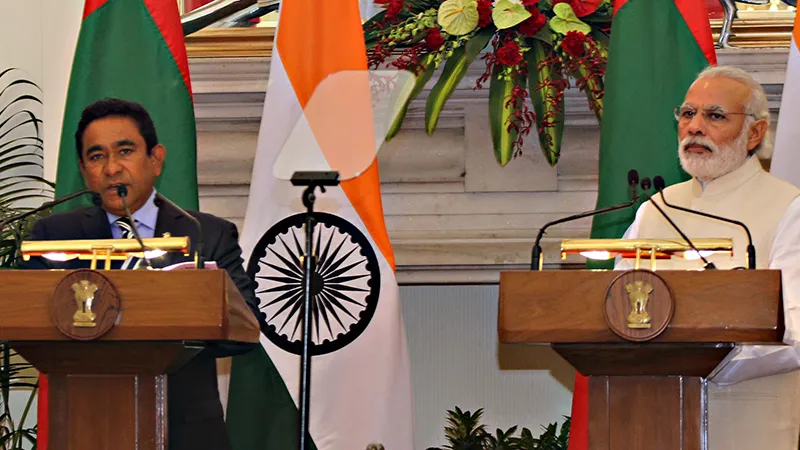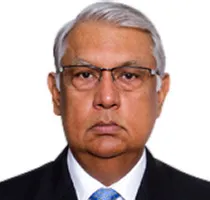Maldives, a SAARC member country, has been in the news for all the wrong reasons. It remains on the cusp of facing action by the Commonwealth for human rights abuses that include the sensational and high profile case of imprisonment of former President Mohamad Nasheed, on trumped charges of “terrorism”. Nasheed is currently living in London, having been released ostensibly for medical treatment by the current government of President Abdulla Yameen. Nasheed’s release was certainly a result of the pressure mounted by the Commonwealth and India.
Prime Minister Modi, despite launching his “neighbourhood first” policy, cancelled a scheduled visit to Maldives in March 2015, when Nasheed was arrested and imprisoned. Modi has not set any dates for a future visit. President Yameen was recently in India to mend fences with the Indian government. Yameen was accompanied by his Foreign Minister and the Minister of Fisheries and Agriculture during his State visit to India. Three Members of Parliament were also in his entourage. The visit was a part of his lobbying effort to avoid censure by the Commonwealth Ministerial Action Group (CMAG).
During a visit to Malaysia earlier in March, Yameen had lobbied this CMAG member and was quoted as saying that “small countries in the Commonwealth and other international organisations need not be unfairly punished”. Maldivian Ministers have been visiting other CMAG member countries to lobby for suspension of any action by the Commonwealth. It has managed to stave off action because India and some other countries have spoken up in its favour. Maldives came under the CMAG scanner following the ouster of President Nasheed in 2012 in a coup. The CMAG’s potential threat of action prompted Maldives to issue a counter threat of walking out of the Commonwealth.
Both India and Malaysia are members of the CMAG which had requested Maldives to take a number of steps to improve the human rights situation in the country, by inter alia, releasing imprisoned politicians, allowing those activists in exile to return and enabling all-party talks to foster a more democratic polity. Under pressure, Yameen invited the opposition Maldivian Democratic Party (MDP) and the Adhaalath Party (AP) for talks but the opposition has demanded the release of all jailed opposition leaders as a quid pro quo. The AP leader, Sheikh Imran Abdulla has since been shifted from prison to house arrest.
During his India visit, Yameen met the Indian political leadership and is reported to have thanked PM Modi for preventing any CMAG action against Maldives. India remains unhappy with certain moves made by the Yameen government that has constrained democratic forces and led to the imprisonment of former President Nasheed on concocted charges of terrorism. Yameen has also reneged on agreements reached with the opposition parties and continues to play footsie with China. These have led to tensions in India-Maldives relations.
Yameen’s authoritarian style of governance has led to huge opposition within Maldives, earning the country a very negative image abroad. Yameen’s election as President was seen as controversial, with a partisan judiciary functioning against the popular will. Yameen has gone after the judiciary and impeached two judges of the Supreme Court who had objected to the repeated postponement of presidential elections. Yameen has also clamped down on civil liberties, sent several journalists jail, raided an independent TV station and harassed his political opponents. Other arbitrary and authoritarian acts of sacking Ministers and senior legal state functionaries on dubious charges, the jailing of Nasheed for 13 years on “terrorism” charges and targeting of opponents’ business interests, has added credence to the belief that he wants untrammelled power, in pursuit of which he was willing to play around with geo-strategic options that would inevitably lead to tension with India.
Yameen entered into deal with the MDP to call of the three month old agitation and pass crucial bits legislation, including one on land rights in return for sending Nasheed into house arrest. MDP cooperated and legislation was passed in Parliament. Nasheed was sent into house arrest, but, soon was sent back to prison. Yameen was signalling to his opponents that he could not be trusted. Yameen’s purpose was to somehow to amend the land holding legislation to pass on the benefit to China, his new found friend.
Yameen had hosted President Xi Jinping in September 2014, the first ever Chinese president to visit Maldives. The most significant agreement was the MOU on the Integrated Development Project of Ihavan, and island in the northernmost atoll of the archipelago and closest to Indian shores. The island also lies on the seven degree channel in the Indian Ocean which is the main sea line of communication carrying goods and oil. Last year, Maldives decided to borrow USD 400 million from China’s Exim Bank to upgrade the international airport at Male, its capital city. This contract was earlier with an Indian company, GMR Group whose contract was terminated after the coup in 2012 which ousted Nasheed. Arbitration proceedings for compensation are continuing in Singapore. The Beijing Urban Construction Group has been awarded the new contract for the Male airport.
During Yameen’s recent visit to India, PM Modi made it clear that Maldives’ security and stability was linked to India’s national interest and in the Indian Ocean, India will continue to be the net security provider. Yameen made the right noises and reiterated that his government will remain sensitive to India’s concerns and will adhere to Maldives’ “India First” policy. India’s concerns are clearly directed at China’s foray into Maldives, the increasing radicalisation under Saudi Wahaabi influence and the growing numbers of Maldivians joining the Islamic State. Yameen has visited Saudi Arabia thrice. The two countries have signed agreements that would allow Riyadh to build mosques, send clerics and Imams to teach and train Maldivians “true” Islam and spread ideas across the archipelago’s Muslims which will undermine liberal Islamic religious and social practices. The recent Brussels bombings show how the decision by the Belgian government to encourage Saudi Arabia to build mosques and send preachers has now turned into a menace that threatens the whole of Europe.
On the other hand, Maldivian officials have expressed deep concern at the growing influence in ISIS. A conservative estimate has 40 to 50 Maldivians, out of a total population of 350,000, fighting with the ISIS in Iraq and Syria. Maldives has passed a rather draconian anti-terrorist law which human rights groups fear will be used to harass political opponents.
From the Indian perspective, relations with Maldives cannot be handled in black and white categories. The Maldivian leadership has to be kept engaged and persuaded to adopt accepted democratic practices and this is not an overnight process. As for China’s growing footprint, it will have to be monitored and both India and the USA have exchanged information on Chinese activities in Maldives. While Chinese funded infrastructural projects per se are not a problem, it is the extent of Chinese penetration and its geo-strategic ramifications which will concern India. The Chinese are known to bring in PLA labour and prison inmates for executing overseas projects. Imagine a case where such Chinese personnel land up on the Maldivian island with weapons, can the Maldives deal with such a situation? The island may well become a Chinese colony, leaving Maldives helpless to evict the Chinese.
Not just Maldives, but also the Nepalese and Sri Lankan PMs have journeyed to Beijing to search of favours and gifts and not returned empty handed. China’s ability to use its financial muscle to fund projects in India’s neighbourhood is a reality which India acknowledges by also exploring Chinese investments in India. Whether such investments impact on India’s security concerns is the moot question.
India and Maldives have also entered into a counter-terrorism agreement to assist Maldives. Maldivians have a historic connection with the southern Indian state of Kerala where some radicalised Maldivians have been detected. Kerala has pockets of radical Islam activity that remains under close surveillance. PM Modi’s successful visit to Saudi Arabia is expected to lead to greater Defence and Intelligence cooperation between the two countries. This will help monitor developments on the radicalisation front.
During the Yameen visit, six agreements were signed including one on Defence Training and Cooperation. Yameen has also assured India that no external power will be permitted to undertake any military activity in Maldives. India, along with Maldives and Sri Lanka has signed an agreement on maritime security in which Mauritius and Seychelles have joined as observers. It will probably be India’s endeavour to enhance the defence partnerships with all these countries so that India’s geo-strategic concerns are not undermined.
This commentary originally appeared in Daily Sun.
The views expressed above belong to the author(s). ORF research and analyses now available on Telegram! Click here to access our curated content — blogs, longforms and interviews.




 PREV
PREV


